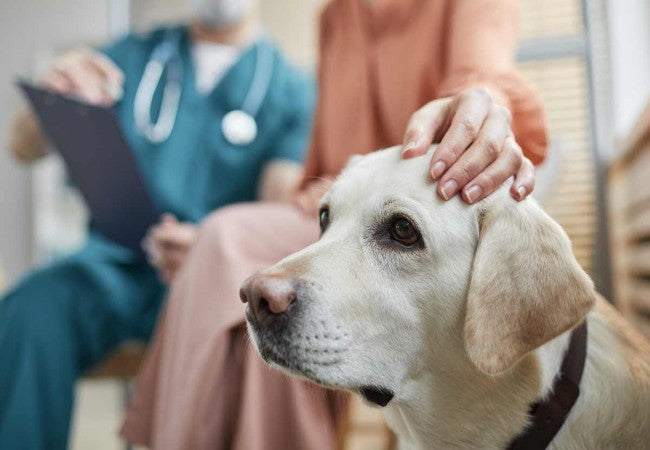Vet Guide to 2025: Should Dogs Wear Perfume? Risks, Safe Choices & Alternatives 🐶🩺

In this article
Vet Guide to 2025: Should Dogs Wear Perfume? Risks, Safe Choices & Alternatives 🐶🩺
By Dr. Duncan Houston BVSc
We all love our dogs to smell fresh—but is it safe to spritz them with perfume? I’m Dr Duncan Houston BVSc, and in this expert guide we explore whether dogs should wear fragrance, the risks of standard perfumes, when pet-safe colognes can be okay, and healthier ways to keep your dog smelling great. and anytime tele-vet support with Ask A Vet. Let’s dive in! 🌿
1. Why Perfume Needs Caution 🚫
- Hyper-sensitive noses: Dogs have ~100,000× stronger sense of smell than humans—overwhelming scents can cause stress, disorientation, or nausea.
- Skin & respiratory irritation: Alcohol, phthalates, VOCs, essential oils (like tea tree or citrus) may irritate skin, eyes or lungs, especially in sensitive or respiratory-prone pets.
- Masked health cues: Veterinarians rely on scent cues—perfumes can hide infections or disease odors.
- Toxic ingestion: Dogs groom themselves—licking perfume residues can lead to drooling, vomiting, GI upset or alcohol/essential-oil poisoning.
2. What Pet Experts Say 🩺
- AKC vets warn human fragrances may irritate skin and overwhelm dogs’ delicate scent channels.
- Reddit users advise against human perfume; they note ingestion and overstimulation risks.
- Some sources suggest alcohol-free, pet-specific colognes may be tolerated if used sparingly and away from sensitive areas.
- PetMD—citing VOC risks—warns that heavy scents may irritate pet airways and skin.
3. When Can You Safely Use Scented Products?
Dog-specific fragrances (often called “pawfumes” or grooming sprays) can be suitable when:
- They’re alcohol-free and formulated for pets’ skin and coat pH.
- They avoid phthalates, parabens, VOCs, and harsh essential oils.
- Application is light—sprayed onto hands or a brush, then applied to the belly/back, not the face or genitals.
- They are used infrequently—no more than once weekly, and only if needed.
- No respiratory or skin issues are present—if they occur, stop using immediately and consult Ask A Vet.
4. Smarter Ways to Keep Your Dog Fresh 🧼
- Bedding care: Wash bedding weekly and use Woopf deodorizing sprays lightly outside of pet reach.
5. Comfort & Safety Tips
- Ventilate: Always apply fragrance in a well-ventilated area.
- Patch test: Try on a small area and monitor for 24 hours before full use.
- Monitor reactions: Watch for coughing, sneezing, itching, lethargy, or GI changes.
- Track scent preference: Some dogs dislike floral/citrus; choose light, natural scents.
6. Ask A Vet When Unsure 📱
If you notice discomfort, persistent coughing, sneezing, dry skin, or appetite changes after using scented products, use the Ask A Vet app for expert guidance, skin checks via photos, and alternative recommendations tailored to your pet’s sensitivities.
7. Quick FAQ 🐾
- Q: Can I use my perfume around my dog?
- A: Bark at caution. Apply to yourself away from your dog, let it dry and ventilate before petting.
- Q: Are essential oil sprays safe?
- A: Generally not—many oils are toxic via skin or inhalation. Avoid essential-oil-based sprays unless vet-approved.
- Q: My dog stinks—what now?
- A: Start with grooming, brushing, baths, medical check (ears/skin/ears), and teleconsult Ask A Vet before trying scents.
8. Summary Table
| Question | Answer |
|---|---|
| Human perfume on dog? | No—can irritate skin, mask issues, or cause ingestion problems. |
| Dog-safe cologne? | Yes—if pet-specific, alcohol-free, applied sparingly, away from face. |
| Better freshening methods? | Frequent grooming, baths, oral care, clean bedding, plus grooming products. |
Conclusion
While the idea of a lightly fragranced pup may seem fun, it's often unnecessary or harmful. Instead, stick to pet-safe grooming routines, and expert advice via Ask A Vet. Let your dog’s natural scent reflect their health and happiness—fresh, clean, and true to them. 🌟🐾






